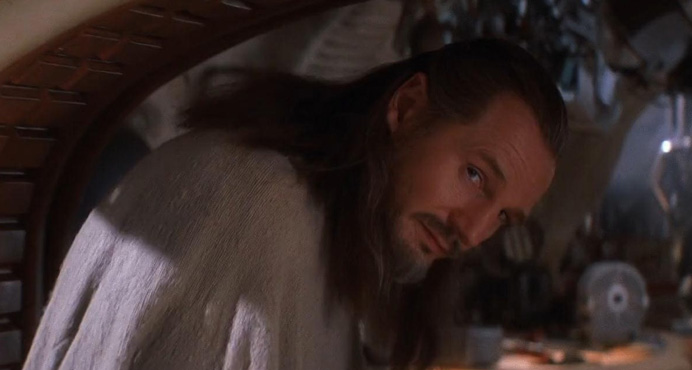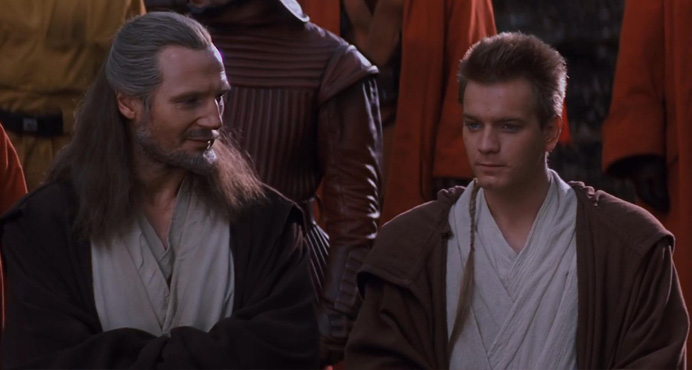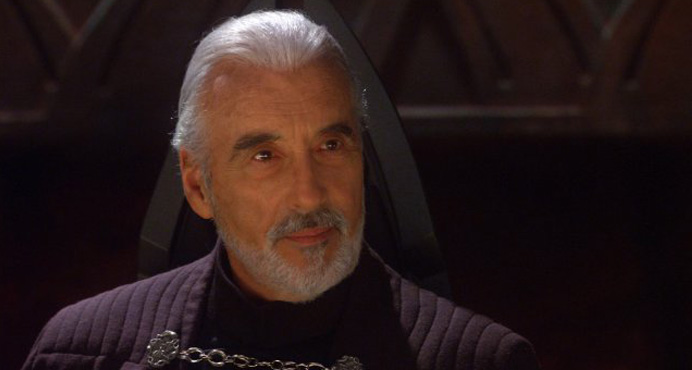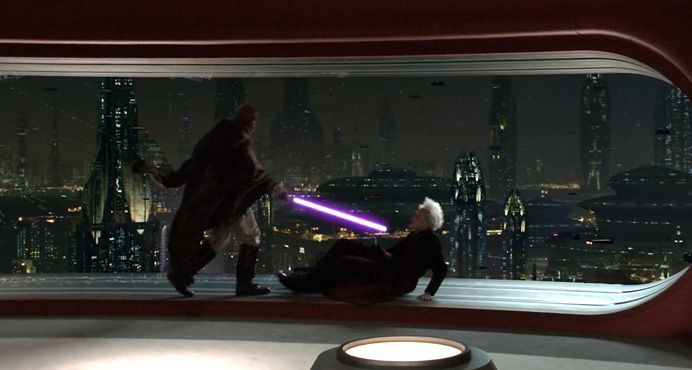
The Star Wars prequels are widely regarded as the worst additions to a beloved franchise of all time. Red Letter Media’s feature-length eviscerations of each film are some of the funniest things I’ve ever seen, but I don’t agree with the central argument. I regularly sit down and watch all six movies, and you know what? The prequels are the best part of the experience every time.
Here’s why.

Episode I : The Phantom Menace (1999) | Dir. George Lucas | 136 min.
I’ve heard many people say Qui-Gon Jinn (Liam Neeson) wasn’t a very good Jedi, and therefore, was poorly written. But that’s far too original series-centric a complaint, and a bad disguise for the real one, or ‘he wasn’t how I wanted a Jedi to be’.
Qui-Gon is a wonderful character precisely because he isn’t a good Jedi. The guy acts like a real, practical person, doing all sorts of underhanded things to ensure the outcome he wants. He mind-controls the chief of an indigenous tribal people to get a ship, fixes bets by using the force, attempts to mind-control a droid (before realising it doesn’t work on them and then just killing it), and even taunts the disguised queen of the Naboo with her true identity right to her face. When she finally reveals herself, everyone looks astonished, but the guy can barely keep from laughing right at her. Look at his reaction in that screenshot. He knew. He knew.
This even explains what many people call ‘bad acting’ by both of the Queen characters in the movie. They’re pretending to be different people from who they really are, and doing such a bad job that Qui-Gon sees right through it. I’m not one to excuse bad acting, but in the context of the story being told, it fits perfectly.
And remember Jar-Jar? That character nobody liked? Qui-Gon hated him too, at one point even knocking him out with the force just to get him to shut up. When this happens, his apprentice Obi-Wan, a stereotypical Jedi (which is a negative quality in the prequels) says “You overdid it”. He totally didn’t. It was intentional. Qui-Gon Jinn is a loose cannon Jedi who doesn’t play by the rules, and not only does the Jedi Order visibly hate him for it, somehow most of the audience does too. They’re wrong. He’s the man.

Episode II: Attack of the Clones (2002) | Dir. George Lucas | 142 min.
Attack of the Clones’ biggest flaw is that there’s no Qui-Gon running around getting things done. However, that’s also its biggest strength—it highlights just how useless the Jedi are as an organisation, and how much they really needed people like him. Again, people criticise this movie because they think the Jedi are poorly-written, but the entire point of the story is that they’re simply really bad at their jobs.
Anakin Skywalker has become a childish, power-hungry mess, as a result of being poorly taught by Obi-Wan, who was only ever training him at all out of respect for his own master’s wishes—if you recall from The Phantom Menace, he hated the kid. Does Obi-Wan feel any guilt or personal responsibility over this? No, he blames Anakin, despite being the man who effectively raised him. Obi-Wan, and the rest of the Jedi, see themselves as infallible. The only time a Jedi comes to any sort of awareness of their own idiocy is when Yoda offhandedly mentions that he has noticed an increasing amount of arrogance in the order, among even the most senior members. He’s right, and he’s one of them.
The closest we get to a Qui-Gon character is Count Dooku, the man who trained him. He’s the movie’s main antagonist—that is, if you believe what the Jedi tell you. In his two main scenes in the film, he makes it clear that he is trying to find and destroy the Sith lord himself, and appears genuinely hurt when Obi-Wan accuses him of just being evil. When told the Jedi he has at gunpoint will never surrender, even if it means their death, he once again looks like he’s about to cry, and apologises for it.

Episode III – Revenge of the Sith (2005) | Dir. George Lucas | 140 min.
In the above image, Mace Windu is yelling “The oppression of the Sith will never return!” as he is preparing to dice a democratically-elected official with his lightsaber. If the other two movies weren’t blatant enough for you about the ridiculous and essentially morally corrupt nature of the entire Jedi organisation, this image alone hammers it home brilliantly.
Upon discovering the Chancellor of the Republic is actually a Sith Lord, Windu and a cadre of others immediately try to murder him in his chamber. Does this sound like a peaceful order of enlightened monks to you? The ideology of the Jedi is so closed-minded that, even as they claim to be the protectors of peace and justice, they will happily cut down anyone who they see as ‘the bad guys’ without question—all the while spouting such hypocritical rhetoric as “Only a Sith deals in absolutes”. If they had attempted to simply arrest him, in public, surrounded by onlookers, the Empire, and the Original Trilogy, would never have happened. Instead, they did exactly what Palpatine needed them to do—attack him in the most underhanded way possible, so that he would then be justified in giving the order to exterminate them.
Anakin’s final action before officially becoming Darth Vader—cutting off Windu’s hand to stop him from committing what is essentially a military coup—may seem harsh, but it makes sense. The Jedi have gone off the rails. Even Yoda tries to pull a Windu. Isn’t he supposed to be the wisest one?
What makes Yoda’s failed assassination attempt particularly interesting is how it contrasts with his character in the original series. Yoda has certainly grown wiser from his years of exile, but in Episode VI, it always struck me as bizarre how obsessed he and Obi-Wan’s ghost were with convincing Luke to kill his own father, which didn’t suit their ostensibly ‘enlightened’ characters. With the context of the prequels, now it makes perfect sense—the Jedi are closed-minded idiots, and even their smartest surviving members are fallible, and have a massive personal stake in the end of the Empire.
Many have criticized the prophecy applied to Anakin throughout the prequels (of ‘bringing balance’ to the force) as being nonsensical, but it has a far more interesting meaning than how the Jedi interpret it for themselves (balance through destroying the Sith). Anakin facilitates the destruction of all sides of the conflict, and thereby ends it. By killing the emperor and himself—the last remnants of the false Jedi-Sith dichotomy—he finally wipes the board clear. Now that’s what I call balance.
This is the real reason why I think people didn’t like the prequels—because they had the gall to portray the Jedi not as the infallible order that the Obi-Wan of the original saga said they were, but as a rigid and brittle, self-serving, organised religion. It might be less optimistic to show that being a Jedi isn’t the be-all, end-all solution to the problems of the Universe, but I think I like it better that way.
I position myself as someone who actually does not dislike the prequels: Phantom Menance admittedly I find my response is less “dislike” and more “feeling bored” by it – too much of its best moments rely on visual spectacle than being an engaging story; but I’ve often said Attack of the Clones would be a good film had the romantic angle been written & acted better – that aside I rather like Clones as an action movie, even Anakin & Obi-Wan show some charm as the Jedi equivalent of buddy movie cops; and I’m a big fan of Revenge of the Sith, at its core it’s a brilliant tragedy story, it’s only held back in my eyes by being a little too melodramatic and clichéd*, but then again so is Hamlet, albeit melodrama is handled much better by Shakespeare (and I can’t believe I just compared Star Wars to Shakespeare but oh well).
*(you really can’t get more on the nose than the inner turmoil of your tragic hero being represented by a hellish landscape of lava)
But on your article, I find your take on the Jedi fairly interesting (especially Qui-gon, who I liked anyway, but I enjoy your take on him as less a master and more a maverick). However, what I would say hampers your take on the Jedi, is how one-dimensional who they are opposed to are. It’s very difficult as an audience member to interpret them as being militaristic/fascist/etc. when, for all intents and purposes: they’re right – the Sith literally are the embodiment of evil, and Mace is right to try and kill Palpatine, at that point he simply is too politically powerful to bring to fair/peaceful justice. As for Dooku, whilst he could’ve been made into a multi-dimensional villain under the lines you suggested, by positioning him so closely with the Sith Lord and making him culpable in generating a Galactic Civil War, it is difficult to take any assertion by him that he is out to destroy the Sith seriously. So the conclusion I come to in trying to read the movies as you have done is that attempts to generate depth and fallibility in the Jedi is let-down by matching them with a one-dimensional foe – in fact, part of me realises that perhaps this is why Darth Vader worked so well as a foe in the originals (particularly V & VI): he begins as an embodiment of evil but then he has dimensions and motivations beyond “I want to be powerful” – first he wants Skywalker, and we don’t know why, and then we discover the fatherhood subplot (and whilst we cannot be certain of the honesty of his offer: he even wants to usurp Palpatine but only with his son at his side – taken honestly, it makes him more than just Palpatine’s attack wolf but a man with independent ambitious) and of course by the end of VI Vader’s multi-dimensionality comes full circle as he converts from villain to hero.
So, in summary, the star wars prequels aren’t better than /I/ thought, me and you just like them for different reasons .
This is a pretty fascinating analysis of how the Jedi are portrayed in the prequels, and it certainly makes a few of the more frustrating elements a good deal easier to take, but I still think that by and large a lot of the complaints raised about them by people ranging from RedLetterMedia to the nameless rabble of ordinary fans on message boards and the like are pretty valid. It’s an interesting take on the ‘verse that makes parts of it make a lot more sense than the face-value approach people generally take to the Jedi and the Sith, but I’m not sure how much you can really credit George or the movies for that. There are a lot of issues with the prequels that are unaddressed here that leave them, to me at least, still pretty damn bad movies, and I don’t think they’re written cleverly enough to buy that this interpretation was really Lucas’ intent. This is a smart analysis of frankly pretty dumb movies, and while they may be easier to watch with all this in mind, I’d say that’s really a credit to your interpretation more than to the films themselves.